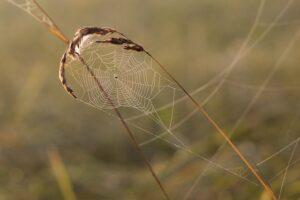Beneficial spiders are declining significantly in agricultural areas
The researchers of the ELKH Agricultural Research Center (ATK) and Ecological Research Center (ÖK) draw attention to the significant decline of beneficial spiders in agricultural areas based on their latest study.

(Photo: Pixabay)
By repeating a two-year study 23 years ago, the researchers studied the long-term changes in populations of spiders that play a useful role in agriculture. The publication presenting the results of the investigation was published in the scientific journal Scientific Reports – ELKH informed MTI on Wednesday. A comparison of the results of the tests showed that the population of spiders has decreased significantly, by about 50 percent, in domestic agricultural areas over a period of almost a quarter of a century. Although the total number of species has changed only minimally, the number of many previously common agricultural species has decreased drastically. “Six years ago, German research shocked the public, which showed that it is no coincidence that car windows need to be washed less frequently on a long journey, as the number of flying insects has decreased by 75 percent in Germany’s protected areas in 27 years,” they recalled.
According to the report, the authenticity of the phenomenon, also known as the “insect apocalypse”, was confirmed by several additional tests
Insects and other arthropods play a key role in the functioning of the earth’s biosphere precisely because of their enormous biomass and species richness, and also in ensuring the existence of humanity through various ecosystem services, just think of the role they play in pollination or in decomposition and soil formation – they highlighted. Spiders are important natural enemies of many insect pests in various agricultural crops. At the same time, as pointed out, the population changes of this group of arthropods are under-researched in comparison to other insects, and in this case it is not clear whether the changes can be traced back to global climate change or changes in local factors.
Hungarian researchers have been researching the problem for decades
The research group led by Samu Ferenc of the ATK Plant Protection Institute (NÖVI) sought the answer to this question with the involvement of the ÖK Lendület Landscape and Nature Conservation Ecology Research Group. According to the report, the researchers repeated the study 23 years ago on an alfalfa field and its grass border that had not been treated with pesticides, in an effort to eliminate the effects of local changes. Regarding the collection period, methods and sampling, the protocol used at the time was reproduced. A comparison of the results of the tests showed a drastic decrease in the number of spiders: 45 percent fewer spiders were found in the alfalfa, while 59 percent fewer spiders were found in the natural grass border surrounding the land. At the same time, only a minimal decrease in species richness was observed, rather the replacement of some species and the decimation of the population of many common species. As a result of this process, the previously markedly separate spider communities of natural and agricultural habitats have now become more similar, which indicates a decrease in diversity, especially in the case of web-building agricultural spider species, they wrote.
The study not only draws attention to the danger of the decline of beneficial spiders
At the same time, he points out that the phenomenon cannot be traced back to possible local changes, but is caused by the mapping of larger-scale processes. “The problem area of climate change, intensive landscape use and the shrinking of nature is well known, but the current research supports with new arguments that urgent action is needed to stop these unfavorable processes,” warned the researchers based on the results of the study.
MTI
Related news
István Nagy: You can join the agricultural crisis insurance system soon
🎧 Hallgasd a cikket: Lejátszás Szünet Folytatás Leállítás Nyelv: Auto…
Read more >The Earth is warming faster than models can track – air pollution has so far masked the true severity of the situation
🎧 Hallgasd a cikket: Lejátszás Szünet Folytatás Leállítás Nyelv: Auto…
Read more >Amsterdam bans meat and fossil fuel advertising as part of fight against climate change
🎧 Hallgasd a cikket: Lejátszás Szünet Folytatás Leállítás Nyelv: Auto…
Read more >Related news
Amikor a megszámlálhatatlan megszámlálhatóvá válik
🎧 Hallgasd a cikket: Lejátszás Szünet Folytatás Leállítás Nyelv: Auto…
Read more >New country director at the helm of JYSK Hungary
🎧 Hallgasd a cikket: Lejátszás Szünet Folytatás Leállítás Nyelv: Auto…
Read more >








